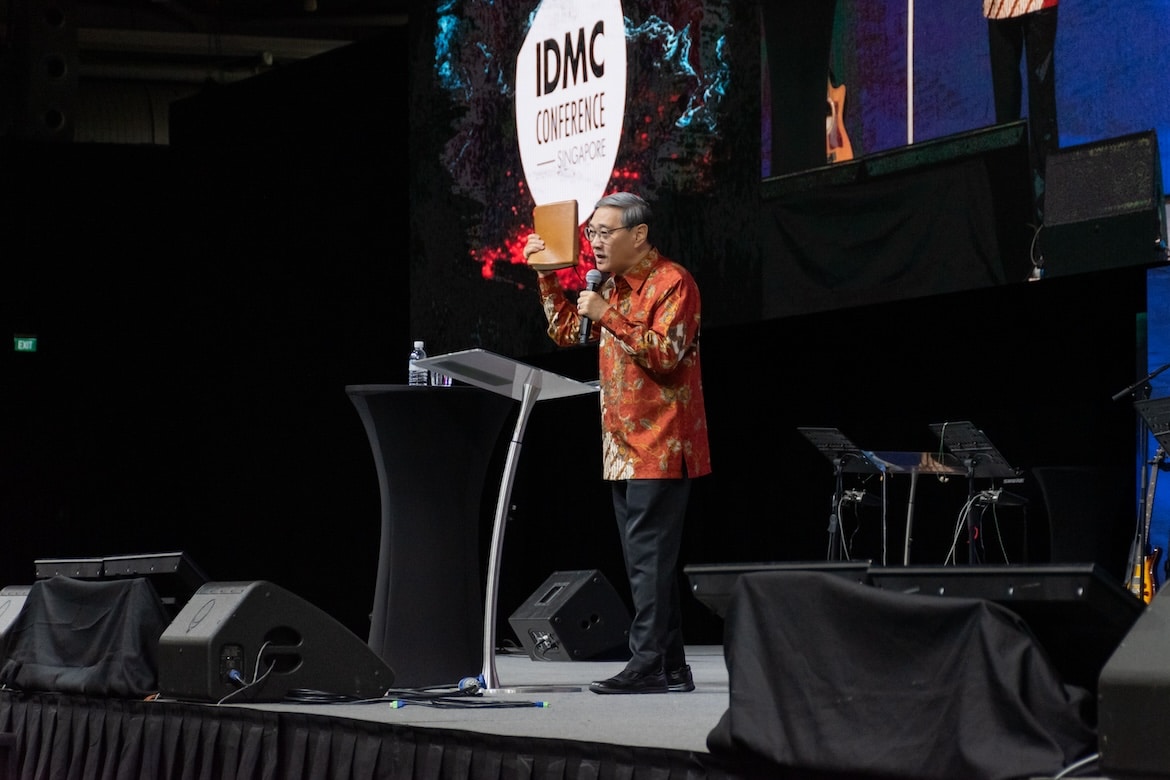“Mentoring myself is the hardest”: Reverend Edmund Chan on the challenges of becoming spiritually mature
by Tan Huey Ying // September 8, 2019, 9:48 pm

“Life is to be a pilgrimage, a journey to be experienced – that’s what spiritual maturity is about,” said Reverend Edmund Chan at the opening night of the Intentional Disciple-Making Churches Conference 2019. Photo by Kevin Kwok.
When only certain parts in our lives – and our hearts – are accessible to God, but other areas are out of bounds to Him, that’s called “spiritual schizophrenia”, said Reverend Edmund Chan unequivocally on the opening night of the Intentional Disciple-Making Churches (IDMC) Conference held at the Singapore Expo last weekend.
“If God is not Lord of all, He’s not the Lord at all,” the Leadership Mentor of Covenant Evangelical Free Church declared, adding that God wants us to give Him all the keys that unlock even the darkest corners of our lives.
Addressing more than 5,000 participants at the three-day conference titled Rethinking Discipleship, Rev Edmund explained that “spiritual schizophrenia” leads to “spiritual compartmentalisation”, which is one of the four things that’s detrimental to discipleship.
Another issue that keeps Christians from becoming more like Christ is “spiritual compromise”, which has its roots in “spiritual presumptuousness”.
For Christians, the choice is not between heaven and hell – that decision was made when we received Christ – but the choice is between heaven and earth.
“We have the presumptuousness of thinking that we can have the best of both worlds, but we cannot walk with God while holding hands with the devil,” he expounded as delegates scribbled notes furiously.
“Too busy” to seek God
The IDMC conference was first initiated by Rev Edmund in 1994 to share what he had learnt about discipleship through his own journey of faith. It was guided by his foundational philosophy towards his ministry in preaching and mentoring: Think big. Start small. Build deep.
“We can’t walk with God while holding hands with the devil.”
Now in its 25th year, attended by delegates from 26 nations and held regularly in over 10 countries worldwide, the conference has come a long way from its small beginnings as a church seminar with an intended attendance of 160.
The significance was not lost on the 61-year-old pastor who prefaced his opening message with this reminder: “At the end of the day – I am very convinced – it is the few lives we invest in that makes a difference.”
It was with the individual believer in mind that he then spoke about what he believes is the biggest crisis the Church faces today – the crisis of discipleship and spiritual maturity.
This “crisis of discipleship” is just one of the many dangers faced by Christians who seek spiritual growth, but it is the crisis because we do not see it, said Rev Edmund. “We do not realise there is a critical discipleship deficit in the Church.”
“It’s not the problem of time, it’s an issue of the heart!”
At the root of this, however, is the fact that people don’t really want God, know God, or seek Him. Because even in “seeking” God, we often give the excuse of being “too busy”, he said.
Rev Edmund broke it down: All of us get 168 hours every week. Equally. Nobody has more and nobody has less.
“Suppose you tithe 10% of your time as you tithe your resources to God – that’s 16.8 hours every week,” he continued.
“It’s not the problem of time, it’s an issue of the heart!”
“It’s not about church attendance”
But do not be mistaken about what appears to be spiritual maturity, Rev Edmund cautioned. “To define something, you’ve got to look at what it is not.”
Leaders fall and ministries implode because we confuse success and effectiveness for maturity.
Attendance in church and zeal for God are not indicators of spiritual maturity. It is possible to have that kind of exuberant display but live a double life where there is compromise and spiritual blindness hidden away from the public eye.
Bible knowledge and spiritual giftedness or anointing are not marks of maturity either.
“People have reduced discipleship to a mere ‘knowledge transfer’,” stated Rev Edmund emphatically. “It is not knowledge that changes lives! Lives cannot be changed unless values are changed.”
Rather, our values, which are the things we hold important in our lives, must be “deeply influenced and impacted by Scripture”.
“The reason leaders fall and ministries implode is because we have confused ministry success and effectiveness for spiritual maturity,” he maintained.

Rev Edmund drew from many anecdotes and life experiences to relate and explain key principles of spiritual maturity. Photo by Eng Keng.
What, then, is spiritual maturity?
Rev Edmund, a highly-regarded expository preacher, went through Colossians 2:6-8 to look at the evidence of spiritual maturity.
The first: Our walk.
Lip-service; we play games like that with God.
To illustrate his point, he regaled the audience with a story of his daughters when they were little. The circus had come to Singapore and everyone in the family was looking forward to going together.
When Rev Edmund decided to give his ticket to a visiting relative, both daughters started squabbling over who would give Daddy their ticket.
It did not last long; both offers were quickly withdrawn when he reached out to accept the tickets.
“‘Daddy, you can take my ticket.’ So sweet, right?” he said with a grin. “But it was only lip service, she didn’t mean it.
“And we play games like that with God.”
The joy of the Lord is supposed to mark the Christian walk.
His point? “True discipleship is not determined by our declarations but by our walk of sacrifice, love, repentance and surrender.”
Another evidence of spiritual maturity is our joy, the expression of gratitude.
“We see a lot of grumbling Christians instead of grateful Christians,” said Rev Edmund. “The joy of the Lord is supposed to mark the Christian walk; it is our strength. When you lose your joy, you lose your testimony.”
He added that when he looks for the spiritual maturity of a believer, he looks at them in the difficult and painful times. “Because it is where you see the substance and foundation of that life, whether it is rooted in trust, joy and gratitude towards the Lord.”
No shortcuts
In the Gospel of John, Jesus called us to a life “more abundantly” (John 10:10, NKJV) but it was never meant to be understood as a destination, he cautioned.
“Life is to be a pilgrimage, a journey to be experienced – that’s what spiritual maturity is about. Growing deeper and deeper and deeper; more and more extraordinarily and abundantly in his grace.”
After 40 years in ministry, Rev Edmund has realised that there is no shortcut.
“I don’t even know how to bring myself to spiritual maturity. Mentoring myself, that’s the hardest!” he said with characteristic bluntness.
“Therefore, I need the grace of God to examine my own life, take stock before Him, then carefully say to the Lord, ‘Reveal to me the things I must grow and change in, because I want to seek You’.”
In walking that journey, Rev Edmund distilled what he has learnt to the basics: Worship, surrender, serve and bless.
“Practise this in your daily life, bit by bit by bit, and you will grow towards spiritual maturity.”
We are an independent, non-profit organisation that relies on the generosity of our readers, such as yourself, to continue serving the kingdom. Every dollar donated goes directly back into our editorial coverage.
Would you consider partnering with us in our kingdom work by supporting us financially, either as a one-off donation, or a recurring pledge?
Support Salt&Light


